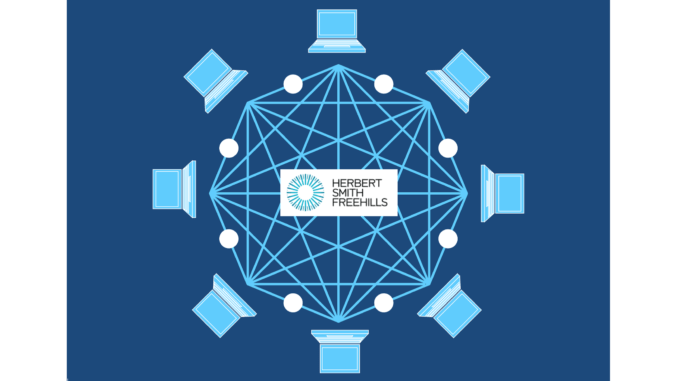
Herbert Smith Freehills (HSF) is one of a growing number of major law firms that believe smart legal contracts are going to eventually become a key part of their business. Artificial Lawyer spoke to members of HSF’s Digital Law group Natasha Blycha and Charlie Morgan about how they see the tech emerging and what they’re doing now.
Blycha and Morgan, Global Head of the Digital Law group and who is based in Australia, and UK Lead for the group respectively, start off by noting that clients ‘just want to solve their legal problems in the cheapest and most efficient way’. That said, this doesn’t remove the need to work really hard inside the firm to provide the cheaper and more efficient ways to meet those legal needs.
The Digital Law group has 28 people, about a dozen of whom are permanently part of it, in offices in the UK, Australia and Asia, with others part of a continuous stream of lawyers rotating in and out of the group to gain experience of where tech and law intersect.
As Morgan says: ‘We are preparing for future business as usual. The Digital Law group helps to immerse our lawyers, to upskill them so they can then go back to their main practice groups [with that knowledge].’
With this knowledge of what smart contracts, for example, and other new tech is all about, they can then talk to clients in a meaningful way.
‘You can’t apply the law [to smart contracts] unless you know how the tech works. We’re not saying all lawyers need to be coders, but they do need to understand the tech, which in turn helps when we are developing tools for the firm and the clients, and that will meet legal requirements,’ he adds.

In our discussion we explore the difference between ‘traditional’ Ethereum-based smart contracts used mostly for digital currency transactions, and complex smart legal contracts as seen with Clause and OpenLaw.
We also touch on the need for all contracts to be machine readable and digital, regardless of whether they are smart or not – which Blycha states is really a necessity now.
Which leads to the question: where is HSF now in terms of smart contract adoption and advising on their use? The answer is that they’ve been busy and are preparing the legal and practical foundations so that when this tech goes mainstream, HSF will be able to swing into action having already understood and mapped out what needs to be done to leverage them.
‘We want to advise clients where there are coded provisions and [where those coded provisions] speak to data sources,’ Blycha explains.
But, this isn’t just theory.
‘We are building a live one [smart contract] for a financial services sector client now,’ Blycha notes, although she cannot say more at this point.

‘I believe that in the next five to ten years it will be standard to have code in B2B legal contracts.’
To do this, and other projects they are working on, they are not just tapping software already in the market, they are working on a range of issues, from ethical and regulatory aspects of smart contracts to what they call the Holy Trinity:
- Legal security,
- Data security,
- Adoptability (ease of use).
They’re also working on the legal language that needs to go into these documents and developing their own tech to support this approach to connected contracting.
Morgan and Blycha add that they have worked through the creation of hundreds of different smart legal contracts, or SLCs, as they call them. These cover everything from trade finance to managed legal services agreements.
In short, everything is in place – and as noted, real life projects have now started too – but we return to one of the key questions: when will this all really kick off at scale?
Blycha comments: ‘There is an inevitably about smart contracts, we have had more than 150 client conversations and the appetite is there. I believe that in the next five to ten years it will be standard to have code in B2B legal contracts.’
However, she notes that this is not all just about law firms. Clients also need to get their own data in order. There’s no point offering a large company a smart contract to execute transactions if the business doesn’t have the right data architecture in place.
After all, the smart contract is just a ‘medium’ through which data passes. Patchy data or unworkable databases make all of this a non-starter. So, there is plenty of work to be done on the client side too.
‘I think that many organisations are moving to become cognitive enterprises and some clients are well on that journey. Cash has become 1s and zeros, and the digitisation of money shows the way,’ Blycha concludes.
Exciting times, but we should not get carried away as we are not yet at the tipping point of SLC use at scale – even if SLC use has now started for real among some firms.
That said, the SLC market has to start somewhere and the legal sector also needs to get prepared. HSF and its Digital Law Group are certainly doing everything they can to be ready, and to have the right people, skills and knowledge in place.